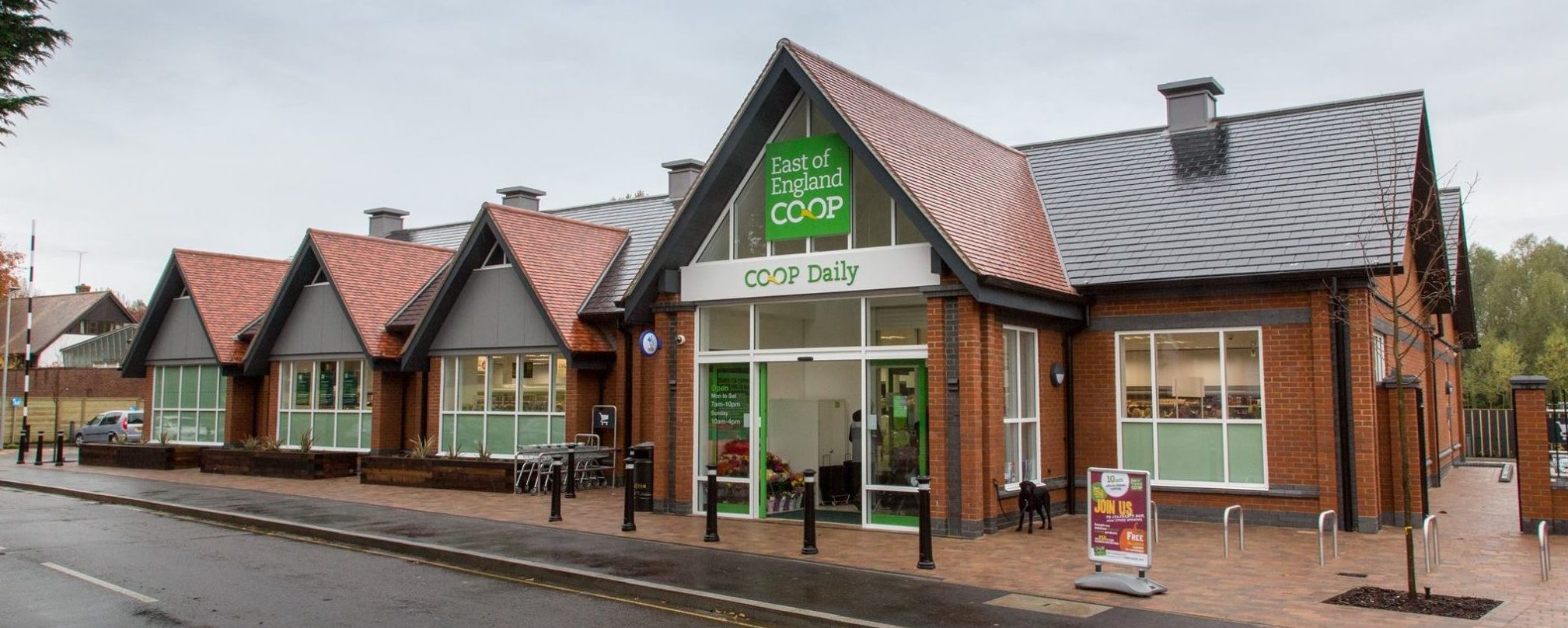Two independent retail societies have announced they intend to fully join the National Integrated Supply Chain operated by the Co-op Group, which will supply their stores with all fresh, frozen and ambient products.
Under a historical agreement, the Group supplies East of England and Lincolnshire co-operatives with fresh and frozen products, but until now the societies have maintained their own independent distribution of ambient goods (food that can be safely stored at room temperature in a sealed container). This move, which would see the Group distributing ambient goods to them too, could result in the combined closure of three distribution centres and over 280 job losses.
East of England
The East of England Co-op has 125 food stores across Norfolk, Suffolk and Essex. Ambient goods, which account for almost half of all products sold by the retailer, are delivered from its distribution centre on Boss Hall Business Park in Ipswich, which employs 174 people.

“Fully integrating our business into the [Group’s] National Integrated Supply Chain means our customers and members can benefit from greater economies of scale,” said Roger Grosvenor, joint chief executive at East of England.
“Part of this agreement involves a decision in principle to close our distribution centre at Boss Hall Business Park in early 2020. This is subject to consultation with colleagues and the USDAW trade union.”
Consultation began with East of England colleagues on Monday 10 July. If the decision to close is confirmed colleagues, who are currently being supported by the society’s HR Services team and USDAW representatives, would then have the option to redeploy within the organisation, transfer to the Co-op Group or take redundancy.
“The Co-op Group is investing heavily in its own supply chain,” said an East of England spokeswoman. “This includes building a new distribution centre close to our trading area, which can handle the requirements of our branches at the level of service we expect.
“We are faced with ongoing increases in competition and the need to achieve further efficiencies. We believe we have a one off opportunity to make the decision to be part of the network whilst Group are planning their new capacity.”
The move would also affect Chelmsford Star, which is supplied with ambient products from the East of England distribution centre. Chelmsford Star originally shared a warehouse with the Norwich Co-op Society, Ipswich Co-op, and the Colchester & East Essex Co-op, under the auspices of the East Anglian Federal Co-operative Society.
“Over the years, when they combined to become East of England and took over the running of the centre, we’ve continued to work alongside them closely,” said a Chelmsford Star spokesman.
“We cannot make any concrete decisions while this plan is still in the consultation phase, but it would seem appropriate to fully integrate into the Co-op Group network at the same time as East of England – if that is the outcome of the consultation – should that be deemed to be in the best interest of our own members.
“We have an extremely good relationship with our neighbours at the East of England Co-op, and we will continue to work with them to further the cause of co-operation wherever we can.”
Lincolnshire
Meanwhile, Lincolnshire Co-op has announced plans to close its two food distribution centre sites in the south of Lincoln, on Whisby Road and Pioneer Way, which currently relay ambient goods to the society’s 83 food stores.
As with East of England, the Group already supplies Lincolnshire with fresh and frozen products. The Group’s network will take over the distribution of ambient goods to Lincolnshire Co-op food stores from Monday 11 September 2017.
“The difficult decision to close our food distribution centres is not one we have embarked on lightly,” said Lincolnshire’s chief retail officer, Mark Finn. “However, we’re confident that this is the right decision for the society because it will lead to significant savings, which we can invest elsewhere.
“It does not in any way reflect on our hard-working colleagues, who we thank for their efforts over the years.”
A total of 111 distribution and office staff are at risk of redundancy, although Mr Finn stressed that the society aims to “redeploy as many of the staff as we are able to”. A support centre has been set up on site to run sessions from JobCentre Plus and the National Careers Services, host presentations from other employers in the area and offer free training sessions and CV writing workshops. Local job vacancies will also be circulated weekly.

“Lincolnshire Co-op is more than 150 years old. During that time, we have changed and reshaped our business to ensure we continue to be successful, recording strong performances which enable us to invest in our services and the community,” added Mr Finn.
“Recently, we’ve seen a shift in what our customers want. They come to us for fresh and frozen food, such as stocking up on fruit and vegetables or picking up a meal for that night. As our demand for the fresh and frozen goods increases, it’s more efficient for us to combine the two separate delivery streams.”
The move will save Lincolnshire around £1m per year, which the society says can be invested into new facilities, improving existing services and keeping prices competitive.
In June, the retailer closed its butchery production facility, resulting in 26 redundancies. However the society confirmed that Gadsby’s Bakery, run by the co-op to provide a range of baked goods across the region, has seen significant investment and “has a bright future”.
A national network – and local commitments
The Co-op Group operates the National Integrated Supply Chain on behalf of a number of independent retail co-operatives, some of whom, like Midcounties and Southern, already utilise the network in full.
A spokesman for the Group said: “We are exploring plans for a new distribution centre in the South East, and we will work closely with colleagues and the Unions over the next two years to ensure continuity of roles at the new site wherever possible.” The Group also confirmed it does not intend to renew the lease at its Cardinal Distribution Centre when it expires in August 2019.
For other societies, such as the Central England Co-operative, it remains business as usual. Central England has its own distribution centre based in Leicester and its Eastern trading region is serviced by Group distribution. A spokesperson for Central England said: “The society’s five year strategy is reviewed by its board of directors each year and at this time there are no plans for change”.
Lincolnshire Co-op highlighted that the society would continue to work with local suppliers and wholesalers to supply locally-sourced goods to its outlets.

And at East of England, Mr Grosvenor confirmed that the announcement would not impact the society’s Sourced Locally initiative, which stocks thousands of local products from over a hundred independent food and drink businesses in the region. The scheme is celebrating its ten year anniversary in 2017 and has so far generated over £57m for the regional economy.
“Most of our locally sourced products travel directly from our suppliers to stores, which means our members and customers can enjoy fresh local produce whilst reducing food miles,” he said.
“We are in the early stages of exploring a local food ‘hub’ which would provide distribution support to Sourced Locally suppliers as well as offering them a route into other markets.”